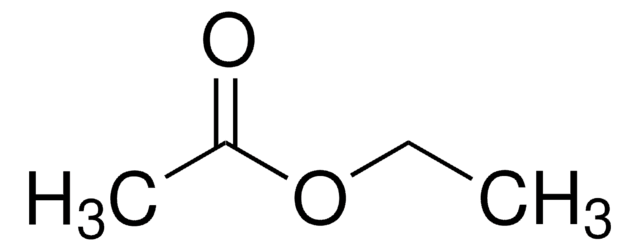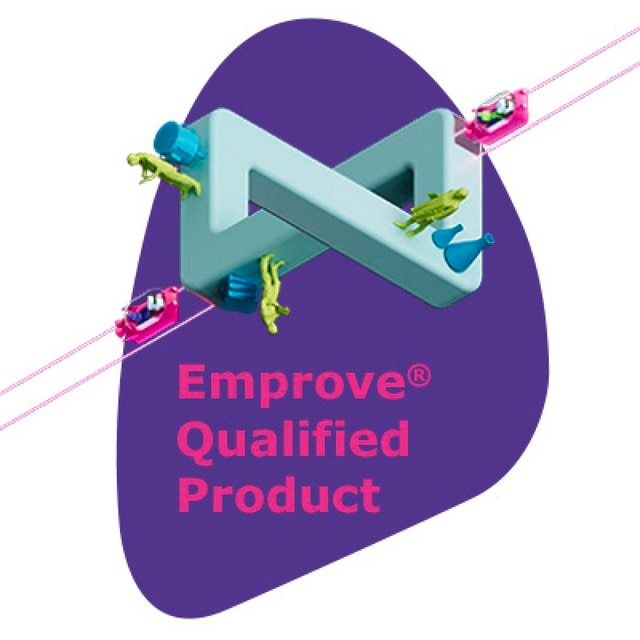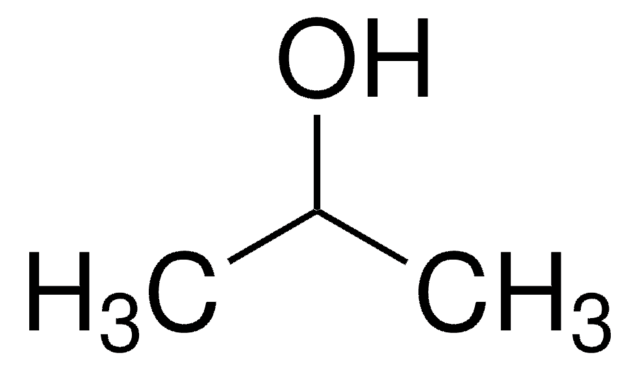1.00868
Ethyl acetate
for liquid chromatography LiChrosolv®
Synonym(s):
Ethyl ethanoate, Acetic ester, Ethyl ester, EtOAc
About This Item
Recommended Products
grade
HPLC grade
isocratic
Quality Level
vapor density
3 (20 °C, vs air)
vapor pressure
73 mmHg ( 20 °C)
product line
LiChrosolv®
Assay
≥99.8% (GC)
form
liquid
autoignition temp.
801 °F
potency
5620 mg/kg LD50, oral (Rat)
>18000 mg/kg LD50, skin (Rabbit)
expl. lim.
2.2-11.5 %, 38 °F
technique(s)
HPLC: suitable
impurities
≤0.0002 meq/g Acidity
≤0.0002 meq/g Alkalinity
≤0.05% Water
evapn. residue
≤2.0 mg/L
transmittance
260 nm, ≥50%
265 nm, ≥80%
270 nm, ≥98%
refractive index
n20/D 1.3720 (lit.)
bp
76.5-77.5 °C (lit.)
mp
−84 °C (lit.)
transition temp
flash point -4 °C
density
0.902 g/mL at 25 °C (lit.)
format
neat
storage temp.
2-30°C
SMILES string
CCOC(C)=O
InChI
1S/C4H8O2/c1-3-6-4(2)5/h3H2,1-2H3
InChI key
XEKOWRVHYACXOJ-UHFFFAOYSA-N
Looking for similar products? Visit Product Comparison Guide
Related Categories
General description
Application
- [Determination of 12 prohibited veterinary drug residues in pig urine by ultra high performance liquid chromatography-tandem mass spectrometry]: Ethyl acetate is utilized for sample preparation in this advanced method to detect drug residues in animal samples, emphasizing its role in veterinary pharmaceutical compliance (Wan et al., 2024).
- Therapeutic effect of Ginkgetin on smoke-induced airway inflammation by down-regulating the c/EBPβ signaling pathway and CCL2 expression: This study explores the anti-inflammatory properties of Ginkgetin, where ethyl acetate is used in the extraction process, highlighting its utility in biomedical research (Tao et al., 2024).
- Effect of methanol extract of Plectranthus esculentus N.E.Br tuber and its fractions on indices of benign prostatic hyperplasia in Wistar rats: Ethyl acetate is employed in the extraction of bioactive compounds for pharmacological studies, showing its critical role in therapeutic applications (Kanu et al., 2024).
- Phytochemical evaluation of Ziziphus mucronata and Xysmalobium undulutum towards the discovery and development of anti-malarial drugs: Demonstrates the use of ethyl acetate in phytochemical screenings, contributing to the development of new anti-malarial medications (Buthelezi et al., 2024).
- The First Records of the In Silico Antiviral and Antibacterial Actions of Molecules Detected in Extracts of Algerian Fir (Abies numidica De Lannoy) Using LC-MS/MS Analysis: This research utilizes ethyl acetate for extracting compounds from plants for antiviral and antibacterial testing, underscoring its importance in the study of natural products (Benouchenne et al., 2024).
Preparation Note
Other Notes
Legal Information
Signal Word
Danger
Hazard Statements
Precautionary Statements
Hazard Classifications
Eye Irrit. 2 - Flam. Liq. 2 - STOT SE 3
Target Organs
Central nervous system
Supplementary Hazards
Storage Class Code
3 - Flammable liquids
WGK
WGK 1
Flash Point(F)
24.8 °F
Flash Point(C)
-4 °C
Certificates of Analysis (COA)
Search for Certificates of Analysis (COA) by entering the products Lot/Batch Number. Lot and Batch Numbers can be found on a product’s label following the words ‘Lot’ or ‘Batch’.
Already Own This Product?
Find documentation for the products that you have recently purchased in the Document Library.
Customers Also Viewed
Articles
HPTLC separation followed by UV detection of the bitter acid content in various hop samples.
HPTLC-MS was used to analyze stevioside and rebaudioside in artificial sweeteners, stevia plants, cola and isotonic drinks with a minimum of sample preparation.
HPTLC is an efficient method to determine Steviol Glycosides content in Stevia using our HPTLC plates and reference materials, including a new introduced Stevia extract reference material.
Protocols
Silica gel G 254 plates are suitable for analysis of Dextromethorphan following the European pharmacopeia monograph.
Powdered black pepper was chosen as example for dietary supplements, being a source for pierine. It is tested according to the current United States Pharmacopeia (USP) guidelines using HPTLC and HPLC.
broad spectrum insecticide, egradation product, phenylpyrazole pesticide, World Health Organization (WHO), HPLC, UV, testing of Fipronil and Fipronil sulfone in Food
Separation of (±)-α-Tocopherol, analytical standard; Menadione (K3), analytical standard; (+)-γ-Tocopherol, analytical standard; Cholecalciferol (D3), analytical standard
Related Content
Separation of Astaxanthin; Xanthophyll
Our team of scientists has experience in all areas of research including Life Science, Material Science, Chemical Synthesis, Chromatography, Analytical and many others.
Contact Technical Service





